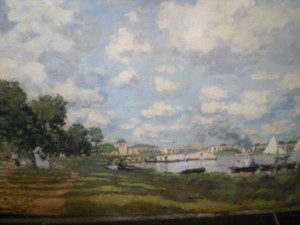Nineteenth-century figures
walk beside a river basin.
Some carry umbrellas
and discuss the French weather.
Three or four strollers
sit down on the bankside
watching sailboats:
parasol ladies onshore.
What could they know of
world war, AIDS, or acid rain
under trees that cast
shadows on afternoon grass?
A small barge glides toward an arched bridge.
You stand distracted
a moment in the gallery
fusing with light
strokes of soft blue paint
Monet’s view stiller now
than your own digital time.
…………………………………………………………………………………………………
A poem about contexts, now and then. A poster of this painting hung on my study wall over my desk through the ’80s, when this poem was written. I almost wrote “than your own, in digital time” for the last line, thinking “than your own [view]”. Certainly our own contemporary views and sensibilities have been altered/fractured by our digital media, culture, and world. A wholly different paradigm from even the twentieth century, never mind the nineteenth.
I suppose we long for other times and other places and therein lies the charm, fascination, and romance of dreaming and much of the romantic arts. The twentieth century references in the middle were purposely jarring and foreshadow the shift to the modern viewer in stanza 4–a visitor to an art gallery who has imaginatively entered Monet’s world in the context of the electronic age, an age which is faster moving than the relatively sedentary pace of the Impressionists’ period, when there was or seemed to be more time, leisure, and fewer modern anxieties and large crises that mark our ‘brave new world’.
As mentioned, this is a poem of contexts. Even “you” the reader and gallery visitor are or become a “moment in the gallery”, as in you are, briefly, a “moment”, as much as the figures in the painting, or the people that inspired the painting’s figures. Viewed a certain way, we are all in a sense (a series of) passing moments or contexts in our various individual lives. Contexts, then, are forever present and changing, and–as I remarked earlier in another entry–can be viewed or perspectived from multiple viewpoints.

